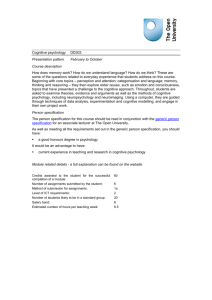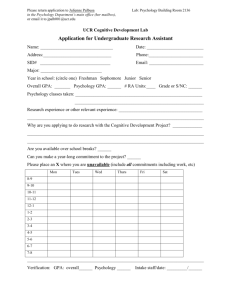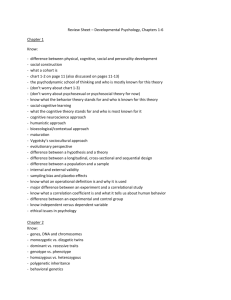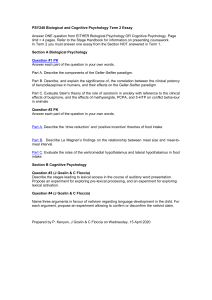Introduction to Cognitive Psychology - U
advertisement
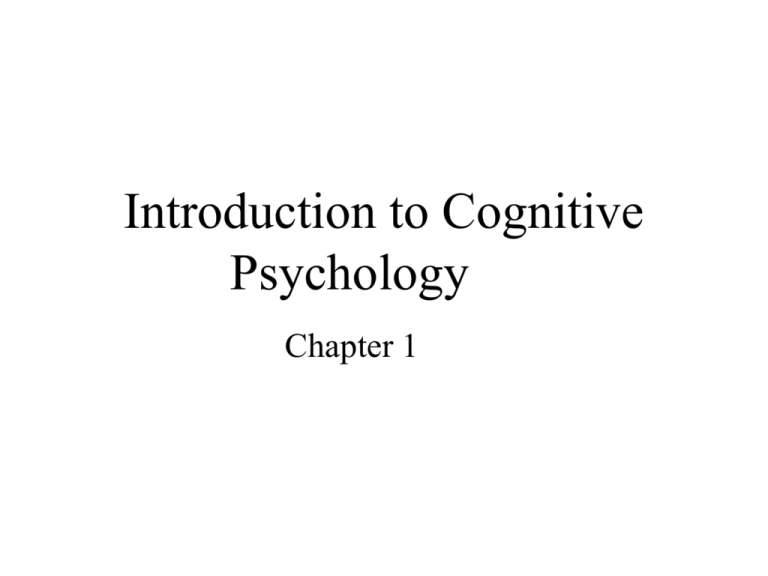
Introduction to Cognitive Psychology Chapter 1 Outline: 1. Cognitive Psychology Defined 2. From Plato to Cognitive Psychology 1. Philosophical Antecedents of Psychology 2. Psychological Antecedents of Cog Psychology 3. Emergence of Cognitive Psychology 3. Research Methods in Cognitive Psychology 4. Key Themes in Cognitive Psychology 1. Cognitive Psychology Defined • Cognitive Psychology – The study of how people perceive, learn, remember, and think. – Examples • How people perceive various shapes • Why they remember some facts and forget others • How they learn language • Cognition (Ashcraft, 2002) – The collection of mental processes and activities used in perceiving, learning, remembering, thinking, and understanding, and the act of using those processes ? If you wanted to understand how people think which method would you use? What would you focus on? 2. From Plato to Cognitive Psychology 2.1.Philosophical Antecedents of Psychology PLATO (ca. 428-348 B.C) – Rationalism – Nature of reality • Reality resides not in the concrete objects we perceive but in the abstract forms that these objects represent – How to investigate reality • Observation is misleading • The route to knowledge is through logical analysis 2. From Plato to Cognitive Psychology 2.1.Philosophical Antecedents of Psychology ARISTOTLE (ca. 384-322 B.C) – Empiricism – Nature of reality • Reality lies only in the concrete world of objects that our bodies sense – How to investigate reality • The route to knowledge is through empirical evidence, obtained through experience and observation • Observations of the external world are the only means to arrive at truth 2. From Plato to Cognitive Psychology 2.1.Philosophical Antecedents of Psychology RENE DESCARTES(1596-1650) – Rationalism – “Cogito ergo sum” – Mental representations • Descartes raised, directly or indirectly, virtually all the significant issues related to the foundations of the science of the mind • He had taken the principles from his writings on meteors, optics, mathematics, and mechanics and considered their applicability to human phenomena – Innate ideas 2. From Plato to Cognitive Psychology 2.1.Philosophical Antecedents of Psychology JOHN LOCKE (1632-1704)– Empiricism – “tabula rasa” (“blank slate”) • both sighted and blind people ought to be able to learn the meanings of words like statue and feel but the blind ought to be unable to acquire words like picture and see… – Learning – Humans are born without knowledge • No innate ideas 2. From Plato to Cognitive Psychology 2.2.Psychological Antecedents of Cognitive Psychology Structuralism – Goal of psychology • To understand the structure of the mind and its perceptions by analyzing those perceptions into their constituent components – Method • Introspection – looking inward at pieces of information passing through consciousness – Proponents • Wilhelm Wundt, Edward Titchener 2. From Plato to Cognitive Psychology 2.2.Psychological Antecedents of Cognitive Psychology Functionalism – Goal of psychology • To study the processes of mind rather than its contents – Method • Various methods – introspection, observation, experiment – Proponents • William James – Principles of Psychology (1890) 2. From Plato to Cognitive Psychology 2.2.Psychological Antecedents of Cognitive Psychology Behaviorism – Goal of psychology • To study observable behavior • Any hypotheses about internal thoughts and ways of thinking are nothing more than speculation • We can not say anything meaningful about cognition – Method • Animal experiments, conditioning experiments – Proponents • John Watson, B.F. Skinner 2. From Plato to Cognitive Psychology 2.2.Psychological Antecedents of Cognitive Psychology Gestalt Psychology – Goal of psychology • To understand psychological phenomena as organized, structured wholes • The whole differs from the sum of its parts – Method • Various methods – experiment, observation – Proponents • Max Wertheimer, Wolfgang Köhler 2. From Plato to Cognitive Psychology 2.2. Emergence of Cognitive Psychology Karl Lashley (1890-1958) – Psychobiological arguments against behaviorism – Playing piano • On a behaviorist, stimulus-response account, an activity such as rapidly playing a correct sequence of notes from memory on an instrument would involve an associative chain of stimuli and responses • Such associative chains can not explain the behavior; input is never put into a a static system, but always into a system which is actively organized 2. From Plato to Cognitive Psychology 2.2. Emergence of Cognitive Psychology Noam Chomsky – Linguistic arguments against behaviorism – Arguments from language acquisition • Behaviorists can not explain how children can produce novel sentences they never heard • Infinite number of sentences we can produce can not be learned by reinforcement – there must be a cognitive algorithmic structure in our mind underlying language 2. From Plato to Cognitive Psychology 2.2. Emergence of Cognitive Psychology Alan Turing – Development of first computers • His “Colossus” computer helped break the German “Enigma” codes during the World War II • It has been estimated that this work shortened the war in Europe by two years – Analogy between computers and human minds • Hardware (brain), Software (mind) • Thinking can be described in terms of algorithmic manipulation of some information • These ideas gave rise to the information processing paradigm in psychology – cognitive psychology ? What can humans do that computers can not? What can computers do that humans can not? 3. Research Methods in Cognitive Psychology How does scientific investigation work? – – – – – Theory development Hypotheses formulation Hypotheses testing Data gathering Data analysis Ecological validity – The degree to which particular findings in one context may be considered relevant outside of that context 3. Research Methods in Cognitive Psychology 1. Controlled laboratory experiments • Characterization – An experimenter conducts research in a laboratory setting in which he controls as many aspects of the experimental situation as possible • Advantages – Enables isolation of causal factors – Excellent means of testing hypotheses • Disadvantages – Often lack of ecological validity 3. Research Methods in Cognitive Psychology 2. Psychobiological research • Characterization – Studies the relationship between cognitive performance and cerebral events and structures – Examples: postmortem studies, animal studies, studies in vivo (PET, fMRI, EEG) • Advantages – “hard” evidence of cognitive functions by relating them to physiological activity • Disadvantages – Often very expensive; risk of making inferences about normal functions based on abnormal brain functioning 3. Research Methods in Cognitive Psychology 3. Self-reports • Characterization – Participant’s reports of own cognition in progress or as recollected • Advantages – Introspective insights from participant’s point of view, which may be unavailable via other means • Disadvantages – Inability to report on processes occurring outside conscious awareness – Data gathering may influence cognitive process being reported ? • Try reporting aloud the various steps involved in grasping a pen? • Now, actually grasp your pen, reporting aloud the steps you take. Do you notice any differences between the first task and this task? • Can you report exactly how you pulled the information into conscious awareness? 3. Research Methods in Cognitive Psychology 4. Case studies • Characterization – Intensive study of a single individual • Advantages – Richly detailed information about individuals, including information about historical and current contexts – Very good for theory development • Disadvantages – Small sample; questionable generalization to other cases 3. Research Methods in Cognitive Psychology 5. Naturalistic observation • Characterization – Observing real-life situations, as in classrooms, work settings, or homes • Advantages – High ecological validity • Disadvantages – Lack of experimental control 3. Research Methods in Cognitive Psychology 6. Computer Simulations and Artificial Intelligence • Characterization – Simulation: Attempt to make computers simulate human cognitive performance – AI: Attempt to make computers demonstrate intelligent cognitive performance (regardless of its resemblance to human cognitive processing) • Advantages – Clear testing of theoretical models and predictions • Disadvantages – Limits of hardware and software 4. Key Themes in Cognitive Psychology 1. Data without a theory is meaningless, theory without data is empty • Example: observation that people’s ability to recognize faces is better than their ability to recall faces – This is an interesting generalization but it does not explain why there is such a difference • A theory provides – An explanation of data – Basis for prediction of other data 4. Key Themes in Cognitive Psychology 2. Cognitive processes interact with each other and with noncognitive processes • Even though cognitive psychologists often try to study specific cognitive processes in isolation, they know that cognitive processes work together • Examples – Memory processes depend on perceptual processes – Thinking depends on memory – Motivation interacts with learning 4. Key Themes in Cognitive Psychology 3. Cognition needs to be studied through a variety of scientific methods • • There is no one right way to study cognition Cognitive psychologists need to learn a variety of different kinds of techniques to study cognition 4. Key Themes in Cognitive Psychology 4. Basic research in cognitive psychology may lead to application, applied research may lead to basic understanding • Basic research often leads to immediate application – Example: finding that learning is superior when it is spaced out over time rather than crammed into a short time interval • Applied research often leads to basic findings – Example: eyewitness testimony research has enhanced our basic understanding of memory systems and of the extent to which humans construct their own memories



